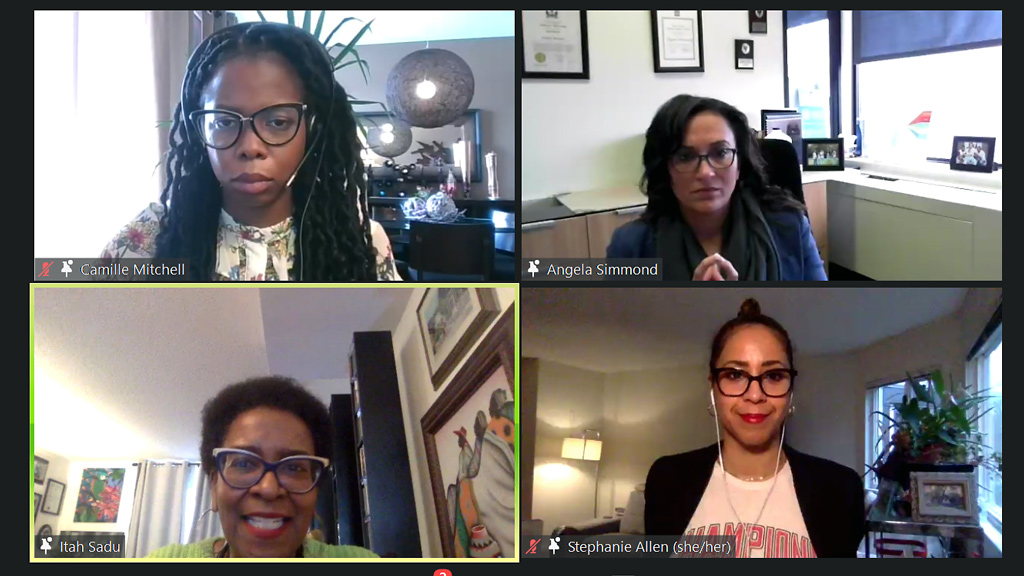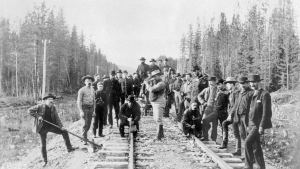The Urban Land Institute’s Toronto chapter kicked off Black History Month with a powerful call for justice, a webinar featuring activists representing Black communities in Halifax, Toronto and Vancouver that have been victims of historical injustices or thoughtless urban renewal.
The Feb. 1 event was billed as Redressing Black Displacement in Canada.
Moderator Camille Mitchell, an architect with Gensler, facilitated a discussion featuring Angela Simmonds, manager of equity and access with the Nova Scotia Barristers’ Society; Itah Sadu, co-owner of Toronto’s A Different Booklist Cultural Centre; and Stephanie Allen, founding member of the Hogan’s Alley Society in Vancouver.
The presenters spoke of barriers large and small that inhibit Blacks from exercising the rights non-Blacks take for granted.
“I think it’s important for the real estate and development communities to take notes, not just listen, but take notes on what they can do within their own circles to effect change,” said Mitchell.
The Vancouver- and Toronto-based speakers spoke of Black community displacement caused by relatively recent developments, while Simmonds discussed how Blacks in Nova Scotia never even got a proper foothold on lands upon their arrival in the region 300 years ago.
Simmonds was recognized with an award by the Nova Scotia Human Rights Commission for her work on the Land Titles Clarification Initiative. The initiative is targeted to help residents in the communities of five historically Black communities obtain clear title to their land.
The British government in the early 1700s made promises to migrating Blacks promising free land, she explained, but what they received was only a license to occupy. Meanwhile white settlers were given title to their lands.
I believe these things can only happen when we dismantle the policies and the processes that have been created against us,
— Stephanie Allen
Hogan’s Alley Society
Today many Blacks in North Preston, northeast of Halifax, still bear the burden of lack of land ownership. The bus, for example, takes an hour to transport residents to the city. There is even a lack of sidewalks.
The fight continues, Simmonds stated, in part because authorities “keep enforcing and interpreting these policies and legislation in the wrong way, which continues to marginalize and oppress certain communities, in particular African-Nova Scotian communities.”
For many years Sadu ran a bookshop in Toronto’s Bloor and Bathurst community, an area notable for its Black businesses and a nexus for community gatherings. Businesses feared displacement in 2013 when Honest Ed’s department store was sold and developer Ian Gillespie set about to build multiple residences.
In 2017 the bookstore moved from the former Mirvish Village into a temporary site across the street at 777 Bathurst, re-established as A Different Booklist Cultural Centre. Next year, it is planned that the centre will move into one of 24 conserved heritage buildings in a revitalized Mirvish Village.
Through the transition, Barbados-born Sadu was established as a cultural hero.
“Suddenly we were told that a new developer was coming and things were changing,” she said. “As people of African descent, change is always part of our DNA.”
Sadu said when discussions focused on the idea of a land trust, it was not part of the everyday conversation in the Black community.
“My mother always says that Canadians have a polite racism. ‘I will send you a plate of food but please do not move next door to me.’ And then when we entered into the conversation of the land trust, there was always the notion that we wouldn’t understand the complexity of this huge thing. So, from the get-go, you are faced with a barrier.”
A key lesson for developers, she said, is to respect the resources, the expertise and the intelligence that Blacks bring to a conversation.
“That’s the first place we’ve got to start. We can have all kinds of conversations amongst ourselves, but when we come into a room, we cannot be seen as charitable, as ‘less than,’ or somebody giving us a handout,” said Sadu.
The Hogan’s Alley Society advocates for Black Vancouverites who have been victims of urban renewal. Fifty years ago, construction of the Georgia and Dunsmuir viaducts displaced an immigrant enclave. The society today is active in working to acquire land and develop assets as a community land trust.
Allen worked in the private sector as a real estate developer and now is an executive with BC Housing.
“My career spans about 19 years in western North America. As someone who has worked so long in that industry I can speak with authority that this is an industry that is definitely rooted in and founded upon white supremacy,” she said, referring to power structures that favour some people and disadvantage others.
Legacy land-use policies, she said, set up cities that put wealthy white landowners on large properties in certain areas and lower-income people of colour in smaller tracts of housing, located in less desirable areas of town.
The racist policies continue to this day, Allen said.
“We talk about the land trust’s community-owned assets as a way of disrupting the white supremacy that has continued to marginalize our people and keep us impoverished.”
Modern-day institutions divide and conquer Black activists, Allen charged, recommending that Blacks demand to be part of any community development process right at the start.
“I believe these things can only happen when we dismantle the policies and the processes that have been created against us constantly that are still entrenched with racism.”
Follow the author on Twitter @DonWall_DCN.











Recent Comments
comments for this post are closed